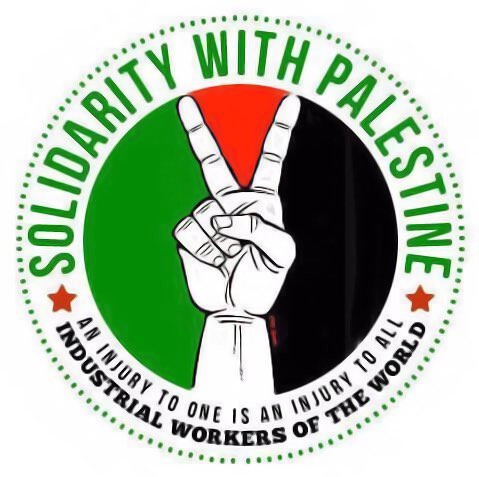Through unjustifiable arrests and baseless charges, Police Scotland are attempting to suppress workers protesting against the genocide in Gaza. In a matter of only two weeks, police have arrested two members of the Edinburgh Gaza Genocide Emergency Committee (EGGEC), and one independent activist.
Earlier in the year, the lead organiser of the Scottish Palestine Solidarity Campaign (SPSC), Mick Napier, was also arrested in Glasgow under trumped-up charges of terrorism – although these charges were later dropped with others upheld. Those facing charges have also been given stifling bail conditions such as not participating in protests, or, in one case, a ban from entering Edinburgh City Centre.
While meant to intimidate and divide us, the actions of the police remind us of how and why the cause of Palestinian liberation is a cause for the entire working class.
Us workers in the UK are currently facing multiple crises ranging from food insecurity, access to healthcare, cost of living, housing, and consequently, mental health. Instead of tackling these issues, the government is working double time to defend the soaring profits of its capitalist leash holders. It is through this lens that we must understand this Police repression and the government’s stance on Palestine.
Domestically, the Palestinian cause has seen millions mobilise to fight back against the government’s political and military support of the genocide in Gaza. Trade unions have come out in support of the Boycott, Divestment, and Sanctions movement. Workers have blockaded arms factories and forced employers to take concrete stances on the issue. These displays of solidarity terrify those in power.
In response to these mobilisations, Rishi Sunak made an unhinged televised speech belittling the Palestinian cause and reducing our protests and acts of solidarity to an “extremist disruption”. He further asked the police to “not merely manage these protests, but police them”, in other words, to treat them criminally.
Sunak’s speech was shortly followed by the government’s new definition of “extremism”. Similar to the Policing Bill of 2022 and the Public Order Bill of 2023, this definition aims to suppress forms of opposition to the government. While currently aimed at those organising around Palestine, and previously against environmental activists, there is no doubt that it will be weaponised against any trade unionist and worker who tries to speak out against issues that impact our livelihoods.
Internationally, as in the UK, we have seen thousands of workers in the Arab region protest against their governments’ complicity in the ethnic cleansing of Palestinians and normalisation of relations with the ‘Israeli’ state. These mobilisations directly threaten the UK’s access to foreign markets, cheap labour, and cheap raw materials which form the extractive base of the ruling class’s profits and the consumerist scraps thrown at us to turn a blind eye.
To protect this access, and despite both domestic and international calls for a ceasefire, the UK Government continues to provide ‘Israel’ weapons as it indiscriminately slaughters Palestinians as well as military intelligence via reconnaissance planes. The government has also moved three frigates to the region and is set to deploy an aircraft carrier making this its biggest military footprint since the Cold War.
The above makes it clear that the Government will do everything in its power to protect capitalist profit. This includes subduing workers at home by intimidating and criminalising working-class organisers, and squandering millions on the military to protect its markets instead of tackling the most pressing issues in our communities.
We must not bow down to these tactics of intimidation and the legal confinement of our words and actions. We must meet the challenge of the government head-on with the same bravery and dedication displayed by the Palestinians resisting their extermination. We will only get what we are organised to take and together we will continue to fight against the genocide and the capitalist system which enables it.
